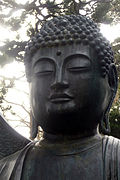Characterization
A diverse organization spread across the United States and with a small presence in Europe, the White Plum Asanga
[I]ncludes teachers who represent the spectrum of styles to be found to American Zen—socially engaged Buddhism, family practice, Zen and the arts, secularized Zen, and progressive traditionalism." [4]
Conceived of informally in 1979 by Maezumi and Tetsugen Bernard Glassman, the White Plum Asanga was named after Maezumi's father Baian Hakujun Dai-osho and then later incorporated in 1995 following Maezumi's death. Tetsugen Bernard Glassman was the White Plum Asanga's first President and his successor was Dennis Genpo Merzel. [5] Following Merzel's term, in May 2007, Gerry Shishin Wick served as elected President of White Plum, until 2013 when Anne Seisen Saunders became the president. [6]
This page is based on this
Wikipedia article Text is available under the
CC BY-SA 4.0 license; additional terms may apply.
Images, videos and audio are available under their respective licenses.


